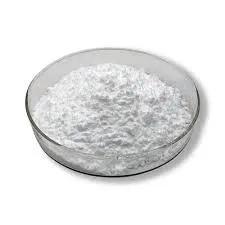
Jul . 26, 2024 16:25 Back to list
Top Manufacturers of Methyl Hydroxyethyl Cellulose for Diverse Applications and Industrial Uses
Understanding Methyl Hydroxyethyl Cellulose (MHEC) Manufacturers
Methyl Hydroxyethyl Cellulose (MHEC) is a versatile cellulose ether widely used in various industries, including construction, pharmaceuticals, food, and personal care products. Due to its unique properties, including water retention, thickening, and binding capabilities, MHEC has become an essential ingredient in many formulations. This article explores the significance of MHEC manufacturers, their production processes, and the applications of MHEC in different sectors.
MHEC is derived from natural cellulose, making it a semi-synthetic polymer. The manufacturing process typically involves the modification of cellulose through methylation and hydroxyethylation. This process enhances the solubility of cellulose in water and provides a range of functional properties that are highly sought after in industrial applications. MHEC can be produced in various viscosity grades, allowing manufacturers to customize the product according to specific requirements.
The role of MHEC manufacturers is crucial in ensuring the consistent quality and availability of this compound. Quality control is paramount during the production process, as impurities or inconsistencies can significantly affect the performance of MHEC in end products. Leading manufacturers adhere to strict industry standards and regulations, employing advanced technologies and techniques to produce high-purity MHEC.
In the construction industry, MHEC is widely used as a thickening agent in cement-based formulations such as tile adhesives, grouts, and plaster. Its property of enhancing the workability of mortars and improving water retention makes it indispensable in construction applications. MHEC allows for longer open times, ensuring that tile setters have ample time to adjust tiles before the adhesive sets. Furthermore, MHEC helps prevent sagging in vertical applications, contributing to the overall durability and quality of the structure.
methyl hydroxyethyl cellulose manufacturers

In the pharmaceutical sector, MHEC serves as a binder and controlled-release agent in tablets and capsules. Its ability to form gels and create films makes it an excellent choice for coatings, providing a protective barrier for active ingredients. Additionally, MHEC is utilized in drug formulations to enhance bioavailability, making it a vital component in the development of effective pharmaceuticals.
The food industry also benefits from MHEC, where it is employed as a food additive to improve texture, stabilize emulsions, and enhance mouthfeel. MHEC’s ability to retain moisture contributes to longer shelf life and improved quality in various food products, including sauces, dressings, and bakery goods. Regulatory agencies have approved MHEC for food applications, further establishing its importance within this sector.
In personal care products, such as shampoos, conditioners, and lotions, MHEC is utilized for its thickening and emulsifying properties. It improves the stability of formulations, enhancing the sensory experience for consumers. Moreover, MHEC is used in various cosmetic applications, providing film-forming properties that aid in the longevity of products on the skin or hair.
MHEC manufacturers play a pivotal role in the supply chain, ensuring that industries can access high-quality products that meet their specific needs. As the demand for MHEC continues to grow, so does the importance of manufacturers in maintaining sustainable production practices. This commitment to sustainability not only helps meet consumer demands but also addresses environmental concerns.
In conclusion, Methyl Hydroxyethyl Cellulose is a critical material with a wide range of applications across various industries. Manufacturers play an essential role in producing high-quality MHEC that meets the specific needs of each sector. As industries evolve and seek innovative solutions, the demand for MHEC and its manufacturers will undoubtedly continue to rise, making them integral to future advancements in technology and product development.
-
Versatile Hpmc Uses in Different Industries
NewsJun.19,2025
-
Redispersible Powder's Role in Enhancing Durability of Construction Products
NewsJun.19,2025
-
Hydroxyethyl Cellulose Applications Driving Green Industrial Processes
NewsJun.19,2025
-
Exploring Different Redispersible Polymer Powder
NewsJun.19,2025
-
Choosing the Right Mortar Bonding Agent
NewsJun.19,2025
-
Applications and Significance of China Hpmc in Modern Industries
NewsJun.19,2025







